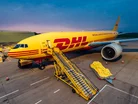DHL Express & Shell: Pioneering Sustainable Air Freight

DHL Express has joined forces with Shell to accelerate the adoption of sustainable aviation fuel (SAF) at Brussels Airport.
The one-year agreement reflects a shared commitment to reducing emissions in air freight while supporting customers in making their supply chains greener.
Under the deal, Shell will provide DHL Express with 25 kilotonnes (kt) of SAF, a cleaner alternative to conventional jet fuel.
The initiative aims to cut carbon dioxide equivalent (CO2e) emissions by an estimated 80 kt compared to using fossil-based jet fuel.
A collaborative push for decarbonisation
The agreement between the global logistics leader and the energy giant emphasises the importance of cross-sector collaboration to tackle aviation emissions.
A Shell spokesperson explained: “We are proud to deliver this new supply of SAF, helping DHL Express and its customers to achieve their net-zero goals. The deal highlights how important collaboration across sectors is in decarbonising air transport.
“We will continue to work closely with our industry players to build on this achievement and accelerate the development of SAF at scale.”
SAF is a cleaner-burning alternative to conventional jet fuel. It is produced by replacing fossil crude oil with renewable feedstocks during refining, a process known as co-processing.
The SAF supplied under this deal will be certified through the International Sustainability and Carbon Certification (ISCC) Plus system, ensuring transparency and accountability in its production and use.
The partnership aligns with DHL’s long-term sustainability goals, including reducing logistics-related emissions to net zero by 2050. SAF’s ability to significantly cut greenhouse gas (GHG) emissions has made it central to DHL’s GoGreen Plus programme.
The role of GoGreen plus
DHL’s GoGreen Plus service empowers customers to address their Scope 3 emissions. Unlike traditional offsetting schemes, which focus on external carbon reductions, GoGreen Plus uses insetting to lower GHG emissions directly within the logistics sector.
The approach enables DHL customers to track and report their emissions reductions voluntarily, supported by a “book and claim” system. This system ensures customers’ investments in SAF are attributed to their carbon reduction efforts, even if the fuel itself is used elsewhere.
DHL has committed to using SAF for 30% of its air transport operations by 2030.
Travis Cobb, EVP of Global Network Operations and Aviation at DHL Express, explains: “Our customers benefit from our continuously increasing SAF coverage across different regions, now including our investment in SAF at Brussels Airport.
“Beside efficiency improvements, SAF is currently the most important way to reduce GHG emissions in air transport.
“Customers can actively contribute to making their supply chains more sustainable by using our GoGreen Plus service based on SAF.”
Building momentum towards net zero
The deal also reflects Shell’s broader commitment to supporting the aviation industry’s transition to sustainable operations.
“Our collaboration with DHL at Brussels Airport reflects a joint commitment to reduce emissions from air freight specifically and across the entire aviation value chain," adds Raman Ojha, President of Shell Aviation.
“Working together not only complements their efforts but also helps advance our shared ambitions for a net-zero future.
“By supplying SAF, we are equipping the industry – and our customers – with low-carbon solutions that will support the transition toward sustainable aviation.”
Both companies recognise that the availability of SAF at scale is crucial to meeting global emission reduction targets.
Initiatives like this serve as a blueprint for how businesses can integrate cleaner technologies into their operations while empowering customers to play an active role in decarbonisation.
By prioritising collaboration, investing in innovative solutions like SAF and focusing on measurable impact, DHL Express and Shell are leading the way in creating a greener aviation future.
Make sure you check out the latest industry news and insights at Scope 3 Magazine and be part of the conversation at our global conference series, Sustainability LIVE and Procurement & Supply Chain LIVE.
Discover all our upcoming events and secure your tickets today. Subscribe to the Scope 3 Magazine newsletter.
Scope 3 Magazine is a BizClik brand.
- What do the Chancellor's Investment Plans Mean for Scope 3?Scope 1 2 and 3
- Sustainable Aviation Fuel's Role in Curbing Scope 3Transportation & Logistics
- Could Business Travel Unlock Supply Chain Sustainability?Scope 1 2 and 3
- What Role does Scope 3 Play in SBTi Delistings?Scope 1 2 and 3

